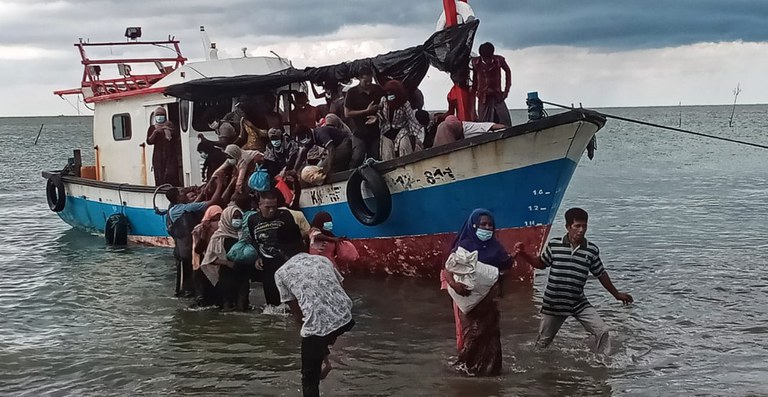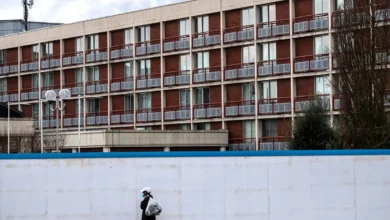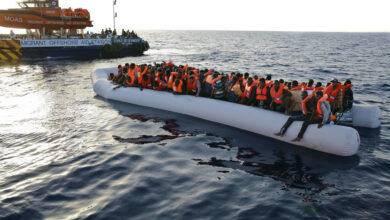Unable to return home, Rohingya risk their lives to leave refugee camps

BY|rfa.org
Human rights defenders are seeing a surge in potentially deadly boat journeys by Rohingya refugees as they try to reach countries in Southeast Asia where they can access schools, food and jobs.
Many of the stateless people have grown desperate because they see no hope of being repatriated to Myanmar, which is convulsed with violence following the February 2021 military coup, rights advocates and NGOs in the region said. The Rohingya also cannot work or educate their children properly at refugee camps in neighboring Bangladesh, where they are prohibited from leaving the camps’ confines.
At this moment, Rohingya are stranded at sea and pleading for help, according to an adviser to Myanmar’s opposition National Unity Government, who tweeted what he identified as a recording of a phone call from a Rohingya aboard a boat. The distress call apparently was made in the past 24 hours.
“Our children have been without food for four to five days. We are all suffering from hunger. So please help us reach the shore,” the caller said, according to a translation provided by a Rohingya in a Bangladesh refugee camp. “A 3-year-old child on board died from starvation. The rest of us are all alive, but we ran out of food completely.
“Please send this information to the people of the world, the UNHCR, governments of Indonesia and Malaysia.”
The unidentified caller said the boat had broken down in what he identified as the Indonesia Sea.
“We are seeing a dramatic rise of Rohingya taking dangerous journeys by boat this year. At the end of November, at least four boats carrying Rohingya refugees left Bangladesh to attempt to reach Southeast Asian shores,” Lilianne Fan, co-founder of the Geutanyoë Foundation, a regional humanitarian organization based in Kuala Lumpur, told BenarNews, an RFA-affiliated new service.
“This is driven by a deterioration of security in both Myanmar as well as in the Rohingya camps in Bangladesh.”
Mahi Ramakrishnan, the founder of another NGO, Beyond Borders Malaysia, said one boat with 200 Rohingya aboard had left Bangladesh to sail to Malaysia at the end of November.
“We also have unverified reports of more boats adrift at sea for more than two weeks now. The most important thing for Malaysia to do is to send out the maritime agency officers to the sea to locate these boats, bring them to the shore and ensure the people are safely disembarked,” she said.
“The persecution by the military junta has been pushing people to flee Myanmar for decades now. The lack of food, clean water plus the inability to exercise their fundamental rights are some of the reasons the Rohingya are fleeing Bangladesh,” Ramakrsihnan told BenarNews.
In early December, the United Nations refugee agency (UNHCR) reported that nearly 2,000 Rohingya had set sail from Bangladesh and Myanmar in the first 11 months of 2022 – compared to 287 in 2021. The U.N. agency estimated that about 120 of those who set sail this year had died or were lost at sea.
“UNHCR … and humanitarian partners are observing a dramatic increase in the number of people attempting perilous crossings of the Andaman Sea this year,” it said in a statement.
“UNHCR warns that attempts at these journeys are exposing people to grave risks and fatal consequences.”
News reports surfaced earlier this month of 154 Rohingya being rescued from a sinking boat in the Andaman Sea and transferred to the Myanmar Navy. Reuters reported that a Vietnamese boat rescued the group, while other news services said two boats from Myanmar’s state-run Oil and Natural Gas Corp. rescued them before their boat sank.
About 1 million Rohingya, including about 740,000 who have fled Myanmar during a brutal military offensive in their home state of Rakhine in 2017, live mostly in crowded and sprawling refugee camps in Cox’s Bazar, a southeastern Bangladeshi district by the Myanmar border.
In November 2017, the two nations agreed to a repatriation plan, but efforts to return the Rohingya to their homes have failed.
“There are many people in the camps who are highly deprived. As they are not seeing any immediate possibility of safe repatriation to our homeland. They are trying to flee from here for a better life,” Muhammed Jubair, the acting chairman of the Arakan Rohingya Society for Peace and Human Rights, a group based in the Cox’s Bazar camps, told BenarNews.
Mizanur Rahman, Bangladesh’s commissioner for refugee relief and repatriation, blamed the dim prospects of repatriation for driving the Rohingya to flee the camps in search of new homes abroad.
“The Myanmar government and the international community have major responsibilities in this regard for ensuring the dignified repatriation of the Rohingya people,” Rahman told BenarNews.
Nur Khan Liton, executive director of Bangladesh human rights organization Ain-O-Salish Kendra, said there were several reasons for Rohingya to seek to leave the camps, including lack of education and recreation opportunities.
He said about 40 Rohingya youth were detained and fined earlier this month for playing football in a playground outside a camp in the Ukhia sub-district of Cox’s Bazar.
Rohingya are seeking a safer and sustainable future, according to Khan.
“There is a serious concern about security in the Rohingya camps. The living conditions are extremely inadequate,” he told BenarNews.
Since September 2021, the security situation inside the camps has deteriorated noticeably, with armed groups and suspected Rohingya militants targeting refugees and Rohingya leaders in a slew of killings.
In November, more than 100 Rohingya landed in a coastal village in Indonesia’s Aceh province after spending more than a month at sea.
Atika Yuanita Paraswaty, who leads the Indonesian Civil Society Association for Refugee Rights Protection (SUAKA), blamed the Myanmar junta for forcing people to flee.
“It’s true, the conditions in the Rakhine and Bangladesh refugee camps are quite improper, nothing more they can do – that’s what made them flee,” Yuanita said. “The government of Myanmar must be held responsible for the condition of the country.
“We, as Indonesian citizens, must help them as mandated by government regulation number 125 from 2016, stating Indonesia should welcome refugees arriving here, although Indonesia has not ratified the refugee convention,” she said.
Some Rohingya try to walk out of Myanmar – but not all are successful.
Authorities launched an investigation after a group of Burmese women discovered 13 corpses believed to be Rohingya near a trash heap in Myanmar’s Yangon region.
Radio Free Asia, a news service affiliated with BenarNews, said residents believed the victims may have been killed by local authorities or brokers hired to help them flee squalid conditions in camps for displaced people in Rakhine state.
Since the 2017 military crackdown there, an estimated 125,000 Rohingya have been confined to camps in the state. RFA data compiled between December 2021 and September found that nearly 800 Rohingya who tried to leave Rakhine by land and water were arrested in different parts of Myanmar.
‘Risk their lives’
In Thailand, which shares a border with Myanmar, a rights defender told BenarNews that traffickers could exploit Rohingya as they try to flee from refugee camps.
“It’s hard to say if the number of Rohingya people trying to reach my country is increasing, as we have seen them trying to come in through all possible ways. They come both by sea and land,” said Puttanee Kangkun, director of The Fort, a project affiliated with Fortify Rights, a human rights group based in Southeast Asia.
“They risk their lives fleeing the desperate situation in Rakhine state, Myanmar, or as refugees in Cox’s Bazar camps,” she said.
Puttanee called on the Thai government to “urgently coordinate with regional governments to conduct search-and-rescue missions for boats of Rohingya refugees adrift at sea.”




